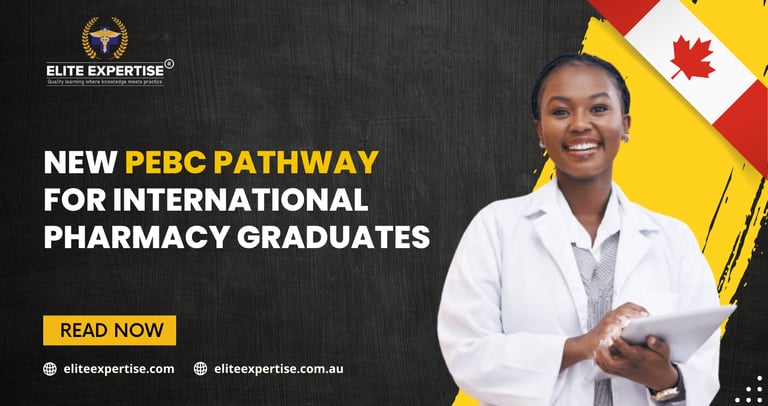ASK MY PHARMACIST | GOT QUESTIONS? Your pharmacist has answers. Click Here
New PEBC Pathway for International Pharmacy Graduates
Learn about new PEBC pathways for Indian pharmacists, skipping the Evaluating Exam. Start with PEBC exam preparation to become a licensed pharmacist.
Radhika
8/28/20253 min read


Indian pharmacists may be eligible to skip the Evaluating Exam and directly take the Qualifying Exam Part 1 (MCQ) and Part 2 (OSCE). This new update took effect in May 2025, streamlining the process for easier entry for those who qualify.
Previously, all candidates needed to appear for the Evaluating Exam before moving to the Qualifying Exam round.
PEBC exam coaching and preparation used to be a lengthy, time-consuming, and costly process for many pharmacy graduates.
Through recent changes, it is possible to skip this step and enter directly into the PEBC Qualifying Exam so that candidates can quickly start their pharmacist career in Canada.
This blog covers everything about this opportunity, including PEBC exam Eligibility for indian students, the process, the benefits, and the PEBC exam steps to begin a career in Canada.
What Is the PEBC Evaluating Exam?
The PEBC (Pharmacy Examining Board of Canada) Evaluating Exam is an entry-level assessment for foreign pharmacy graduates to prove their qualification for Canadian standards.
Previously, passing this exam was mandatory before proceeding to the PEBC Qualifying Exam. It typically focused on biomedical and pharmaceutical sciences, and required significant preparation for the PEBC exam for success.
What Has Changed for Indian Pharmacists
On May 13, 2025, the Pharmacy Examining Board of Canada (PEBC) introduced a new pathway that allows eligible candidates to skip the Evaluating exam and move to the Qualifying exam. However, document evaluation is still a mandatory step and must be completed before confirming eligibility for the Qualifying exam.
This policy aims to align Canadian standards with internationally accredited programs and applicants' real-world patient care experience. It removes a major barrier, saving time and the costs associated with PEBC exam coaching for the Evaluating Exam.
Who Is Eligible Under This New Rule?
The new pathway is accessible to some eligible candidates if they meet certain conditions. Not all international candidates are eligible, and pathways are divided into two:
Pathway 1:
Students who have graduated from pharmacy programs accredited by ACPE (USA) or CCAPP (Canada).
Pathway 2:
Pharmacy graduates of Australia, New Zealand, Ireland, the UK, or South Africa – whose degrees are recognized under PEBC
Graduated from another country, and within 3 years have an unrestricted pharmacist license in the above approved countries or the US.
Practiced for 1 year in direct patient care under that license.
This pathway ensures that graduates from other countries have gained equivalent experience and licensure for practice.
However, all candidates must go through the PEBC Document Evaluation. Whether a candidate is eligible for the Qualifying exam will be decided after document evaluation.
Benefits of Skipping the Evaluation Exam
The decision is to maintain a balance between evaluation and inclusion. It saves costs and time, removes unnecessary hurdles, and creates a smoother immigration process. This new pathway also ensures:
High standards to ensure patient safety and competence
Ensuring equal opportunities for all candidates
Clear eligibility criteria and processes
A smooth process for all stakeholders and educators
Conclusion
The PEBC new pathway provides Indian pharmacists with the possibility of obtaining their license in Canada by skipping the Evaluating Exam if they fulfill the eligibility requirements
While the Document Evaluation step is still obligatory, this modification significantly lowers the expenses and the duration. But successful completion depends on the PEBC Exam preparation course. With proper planning, coaching, and commitment, candidates can become licensed Canadian pharmacists.
How to Start Your Journey – Step-by-Step Guide
This is how candidates from India can get started with PEBC exam coaching and preparation:
1. Complete Document Evaluation
This is a mandatory step for all candidates. All must undergo document evaluation.
2. Confirm Pathway Eligibility
After evaluating documents, if your degree is CCAPP or ACPE-accredited, you qualify under Pathway 1.
If not, check if you are eligible for Pathway 2, have a degree from an approved country, and/or are licensed. Yes, then you can move to the Qualifying exam.
3. Confirm Eligibility
One confirmed, you need to prepare for the Pharmacist Qualifying Examination Part I (MCQ).
4. Take the Part II (OSCE)
If completed, take the Qualifying Examination Part II (OSCE), which assesses clinical skills in simulated patient-care settings.
Important Notes
PEBC Document Evaluation is still mandatory for every international pharmacist.
Only some Indian pharmacy colleges are certified by CCAPP or ACPE—verify before making an application.
Even with the PEBC Evaluating exam exemption, PEBC success depends on passing the Qualifying Exam.


About the Author
Radhika
Content Writer | Elite Expertise
Radhika loves all things content! With a Master's in English Literature and over 4 years of experience in digital strategies. She specializes in creating engaging content across diverse industries - including healthcare, technology, and e-commerce - always writing content that connects to its readers.
Follow On
Follow Us
+91 76750 84909
Privacy Policy | © 2025 Elite Expertise . All Rights Reserved.
ELITE EXPERTISE PTY. LTD (ABN: 15668292439) (ACN: 668292439)
Australian Statutory Education License: OPP 2025 ELITE EXPERTISE PTY. LTD
Disclaimer
Elite Expertise is an online education platform dedicated solely to providing coaching and preparation services for the OPRA, PEBC, PSI and PTE exams. We do not offer any sponsorship or migration services. All information provided on our platform is for educational purposes only and should not be interpreted as legal or immigration advice. For inquiries regarding sponsorship, visa applications, or migration services, please consult with licensed immigration professionals or relevant authorities.
Elite Expertise is a trusted and results-driven training platform specializing in preparation for international pharmacist licensing exams. Our comprehensive courses, expert instructors, and proven methodologies have helped countless pharmacy professionals achieve their goals and succeed in competitive regulatory exams. We are proud of our strong success rate and commitment to excellence.
Elite Expertise is an independent training provider. We are not affiliated with any global pharmacy regulatory authorities or official exam-conducting bodies.
Copyright © 2026 Elite Expertise. All rights reserved.
Address
Unit 1/73 Beverley St, Doncaster East VIC 3109, Australia
